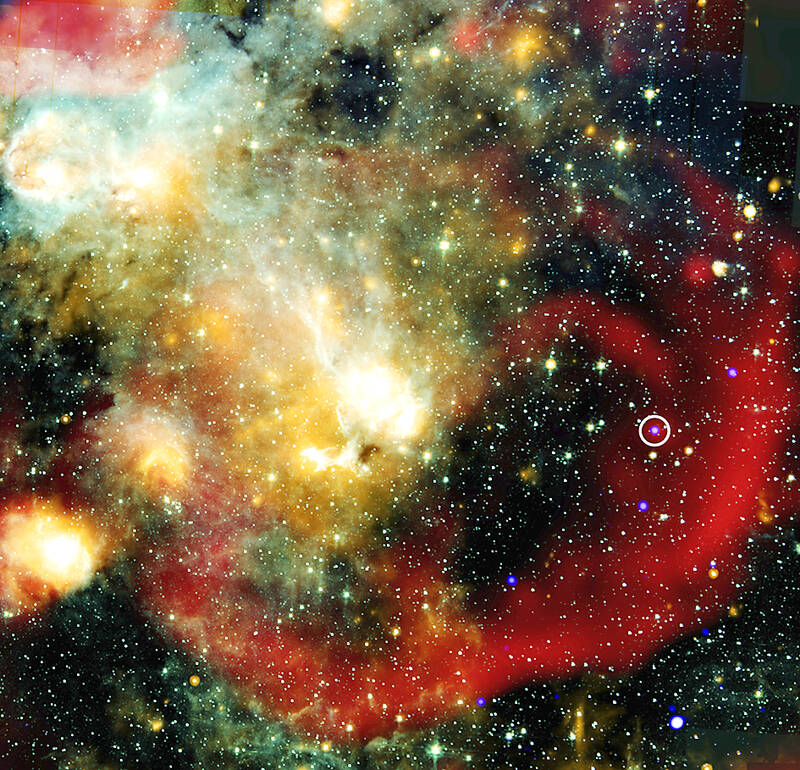Astronomers have spotted a star acting unlike any other ever observed, that is unleashing a curious combination of radio waves and X-rays every 44 minutes, pegging it as an exotic member of a class of celestial objects first identified only three years ago. It is located in the Milky Way galaxy about 15,000 light-years from Earth in the direction of the constellation Scutum.
The researchers said it belongs to a class of objects called “long-period radio transients,” known for bright bursts of radio waves that appear every few minutes to several hours.
“What these objects are and how they generate their unusual signals remain a mystery,” said Curtin University astronomer Ziteng Wang, lead author of the study published this week in the journal Nature.

Photo: NASA/Chandra/Spitzer/MeerKat via AP
In the new study, the researchers used data from NASA’s orbiting Chandra X-ray Observatory, the Australian Square Kilometre Array Pathfinder telescope in Australia and other telescopes.
While the emission of radio waves from the object is similar to the approximately 10 other known examples of this class, it is the only one sending out X-rays, said astrophysicist and study coauthor Nanda Rea of the Institute of Space Sciences in Barcelona.
The researchers have some hypotheses about the nature of this star, including that it might be a magnetar — a spinning neutron star with an extreme magnetic field — or a white dwarf, a highly compact stellar ember, with a close and quick orbit around a small companion star.
“However, neither of them could explain all observational features we saw,” Wang said.
Stars with up to eight times the mass of our sun appear destined to end up as a white dwarf. They eventually burn up all the hydrogen they use as fuel. Gravity then causes them to collapse and blow off their outer layers, eventually leaving behind a compact core roughly the diameter of Earth — the white dwarf.
The observed radio waves could have been generated by the interaction between the white dwarf and the hypothesized companion star, the researchers said.
“The radio brightness of the object varies a lot. We saw no radio emission from the object before November 2023. And in February 2024, we saw it became extremely bright. Fewer than 30 objects in the sky have ever reached such brightness in radio waves. Remarkably, at the same time, we also detected X-ray pulses from the object. We can still detect it in radio, but much fainter,” Wang said.
Wang said it is thrilling to see a new type of behavior for stars.

‘TERRORIST ATTACK’: The convoy of Brigadier General Hamdi Shukri resulted in the ‘martyrdom of five of our armed forces,’ the Presidential Leadership Council said A blast targeting the convoy of a Saudi Arabian-backed armed group killed five in Yemen’s southern city of Aden and injured the commander of the government-allied unit, officials said on Wednesday. “The treacherous terrorist attack targeting the convoy of Brigadier General Hamdi Shukri, commander of the Second Giants Brigade, resulted in the martyrdom of five of our armed forces heroes and the injury of three others,” Yemen’s Saudi Arabia-backed Presidential Leadership Council said in a statement published by Yemeni news agency Saba. A security source told reporters that a car bomb on the side of the road in the Ja’awla area in

‘SHOCK TACTIC’: The dismissal of Yang mirrors past cases such as Jang Song-thaek, Kim’s uncle, who was executed after being accused of plotting to overthrow his nephew North Korean leader Kim Jong-un has fired his vice premier, compared him to a goat and railed against “incompetent” officials, state media reported yesterday, in a rare and very public broadside against apparatchiks at the opening of a critical factory. Vice Premier Yang Sung-ho was sacked “on the spot,” the state-run Korean Central News Agency said, in a speech in which Kim attacked “irresponsible, rude and incompetent leading officials.” “Please, comrade vice premier, resign by yourself when you can do it on your own before it is too late,” Kim reportedly said. “He is ineligible for an important duty. Put simply, it was

PRECARIOUS RELATIONS: Commentators in Saudi Arabia accuse the UAE of growing too bold, backing forces at odds with Saudi interests in various conflicts A Saudi Arabian media campaign targeting the United Arab Emirates (UAE) has deepened the Gulf’s worst row in years, stoking fears of a damaging fall-out in the financial heart of the Middle East. Fiery accusations of rights abuses and betrayal have circulated for weeks in state-run and social media after a brief conflict in Yemen, where Saudi airstrikes quelled an offensive by UAE-backed separatists. The United Arab Emirates is “investing in chaos and supporting secessionists” from Libya to Yemen and the Horn of Africa, Saudi Arabia’s al-Ekhbariya TV charged in a report this week. Such invective has been unheard of

SCAM CLAMPDOWN: About 130 South Korean scam suspects have been sent home since October last year, and 60 more are still waiting for repatriation Dozens of South Koreans allegedly involved in online scams in Cambodia were yesterday returned to South Korea to face investigations in what was the largest group repatriation of Korean criminal suspects from abroad. The 73 South Korean suspects allegedly scammed fellow Koreans out of 48.6 billion won (US$33 million), South Korea said. Upon arrival in South Korea’s Incheon International Airport aboard a chartered plane, the suspects — 65 men and eight women — were sent to police stations. Local TV footage showed the suspects, in handcuffs and wearing masks, being escorted by police officers and boarding buses. They were among about 260 South